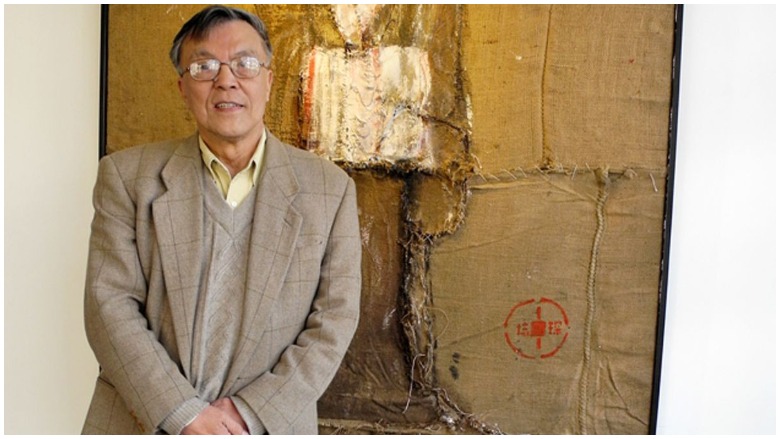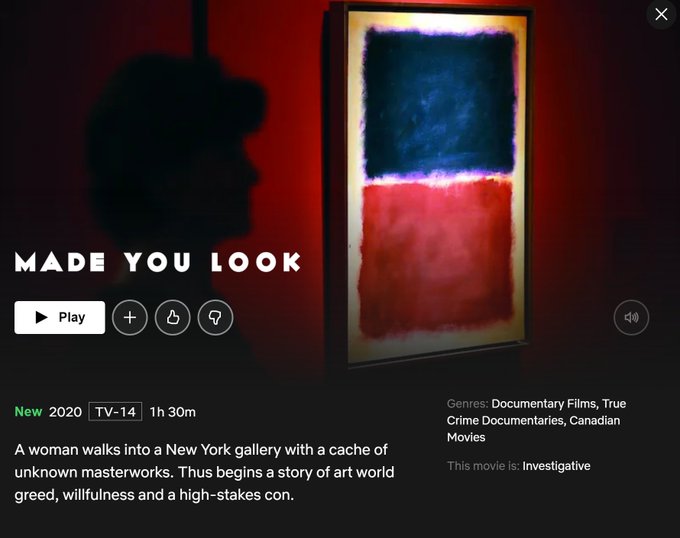
Pei-Shen Qian was a struggling Times Square artist when he was approached by Jose Carlos in the late 1980s, asking him if he could replicate Jackson Pollock. He said he could, and soon found himself at the center of an $80.7 million art scandal.
Qian was indicted, but moved back to China where he remains today and escaped prosecution. In 2014, he was indicted on charges of wire fraud, conspiracy to commit wire fraud and lying to the FBI, according to his indictment. He was 75 at the time of his indictment. He could face up to 45 years in prison if he was convicted of the charges. Now in his early 80s, he continues to paint in a small studio outside Shanghai, but no longer sells his art, his wife told documentary filmmakers.
Qian was one of the multifaceted characters at the center of Director Barry Avrich’s “Made You Look: A True Story About Fake Art.” It’s release was delayed due to COVID-19 and it was released on Netflix Tuesday, February 23, 2021.
Here’s what you need to know:
Qian Claims He Had No Plans to Con Anyone & Did Not Make Significant Money in the Art Fraud Scheme
In China, Qian was a successful and classically trained artist and a professor. In the United States, he tried to make ends meet painting on Manhattan street corners and through construction work. He thoroughly studied the works of famous artists in art class and beyond. His friend, Hongtu Zhang, told filmmakers on “Made You Look” that replicating famous works of art is a common practice in Chinese art.
“Nothing from your heart. You only copy others art,” he said.
“He is good. He had some talent,” he added.
Qian claimed innocence in a December 2013 interview with Bloomberg News in Shanghai, China. He said he was an innocent victim of a “very big misunderstanding” and had no intention to pass off his imitations for genuine works of art by famous painters.
“I made a knife to cut fruit,” he said at the time. “But if others use it to kill, blaming me is unfair.”
Prosecutors said in his charging documents that Qian was aware of the scheme, and participated in it with art dealers Jose Carlos and Jesus Angel Bergantinos Diaz, who were brothers, and Diaz’s girlfriend at the time, Glafira Rosales. The indictment said he would use processes to age the paintings such as dyeing them with tea bags, using a blow dryer on them or exposing them to the elements. It further said he would forge the signatures of famous artists on the canvases.
Qian was initially paid a few hundred dollars for each painting, but after learning his paintings were selling for much more, he demanded a higher price and received about $7,000 per painting.
Qian Is Now Laying Low in Shanghai, Avoiding Media Attention & Continues to Paint in a Small Studio But No Longer Sells His Art
“Made You Look” filmmakers tracked down Qian in China. He had aged and walked with a cane. He identified himself, but was not interviewed on film.
His wife politely declined an interview.
“He is old now. He doesn’t want to be interviewed,” she said in a translation. “He is painting for himself and not selling his art anymore.”
Qian moved to a neighborhood outside Shanghai and opened a small art studio. There, he spoke to ABC News in 2014 and said he was not a knowing participant in the fraud scheme.
“My intent wasn’t for my fake paintings to be sold as the real thing,” he said in a translated interview. “They were just copies that can be put up in your home if you like it.”
He further pointed to his small fee received for paintings that often sold for millions of dollars apiece.
“If you look at my bank account, you’ll see there’s no income. I’m still a poor artist. You think I could be involved with this?” he said.
“These copies were just supposed to mimic them at a basic level, so I was very shocked that people mixed them up,” he said.
The Guardian reported shortly after Qian’s indictment in 2014 there was little chance of extraditing him from China to face prosecution. He has dual citizenship in both China and the United States.
“There is almost no chance that China would turn their own citizen over,” Professor Julian Ku, an expert on China and international law at Hofstra University, told The Guardian. “They generally don’t have a policy of co-operating, and don’t have any reason to turn anyone over, because the US won’t turn anyone over to China.”

